Table of Contents
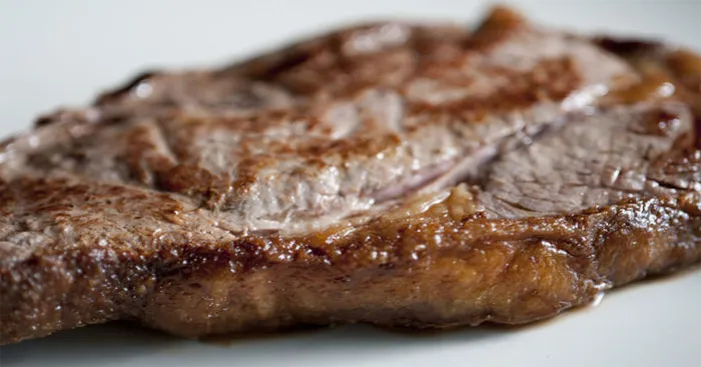
Deer steak is not a famous type of steak but it is definitely a very unique cut.
When we hear the word steak we usually think of pork or beef and not necessarily think of an exotic cut like a deer steak.
It is because of that reason, we decided to introduce you to deer steak to help you get familiar with it and encourage you to try it someday.
In this article, we gathered all the information you need to know about deer steak including its nutritional values, health benefits and side effects, alongside tips on to buy + cook + store it.
Deer farming: overview
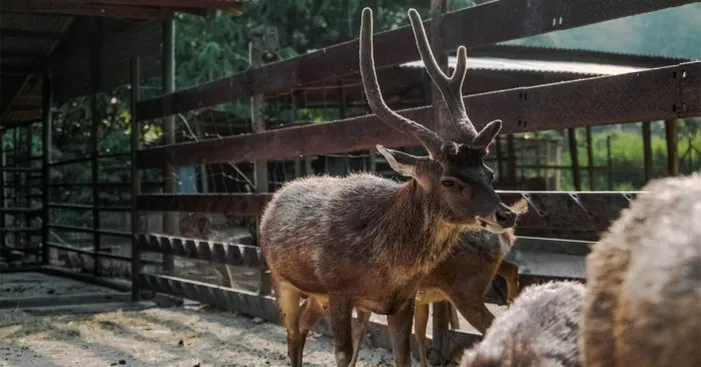
Deer have always played an important role in the ancient mythology of different civilizations such as Celts, Egyptians, and Greeks…
This is because back in those days, humans relied on hunting game animals as a primary source of food.
In 1970, deer farming started in the United states as people started to look for natural and yet profitable ways to make use of their lands.
Deer farming produces a smaller quantity of meat compared to sheep or cow farming but it is profitable in many countries across the world.
Not only raised for their meat, but deer also provide antler velvet that can be processed into natural massaging lotions to deal with joint problems.
Deer steak nutritional values and health benefits:
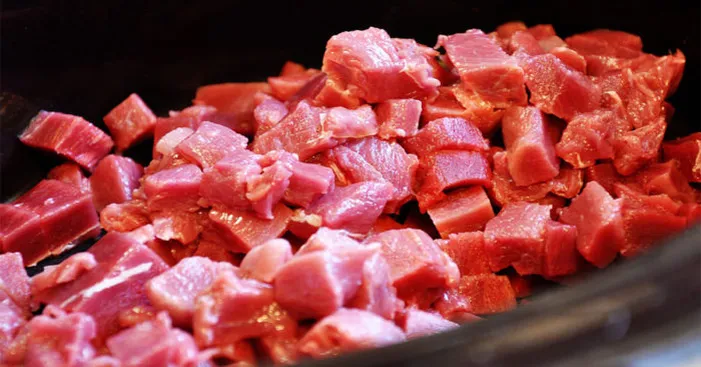
Nutritional values:
These data count for a serving of (85g) a cooked boneless deer steak:
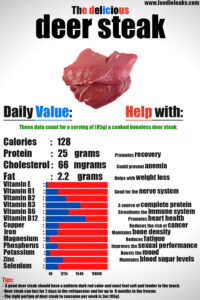
- Calories: 128
- Protein: 25g
- Cholesterol: 66mg
- Fat: 2.2g
- E vitamin: 3%
- B1 vitamin: 20%
- B2 vitamin: 33%
- B3 vitamin: 56%
- B6 vitamin: 37%
- B12 vitamin: 64%
- Copper: 21%
- Iron: 19%
- Magnesium: 6%
- Phosphorus: 19%
- Potassium: 7%
- Zinc: 28%
- Selenium: 20%
Health benefits:
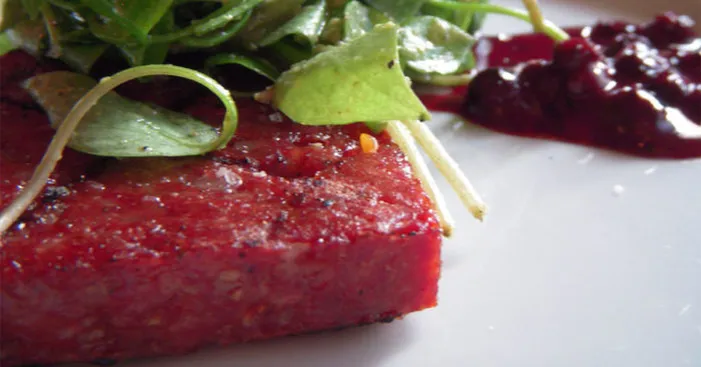
Promotes recovery:
With more than 40% of the daily need in protein for the average person, consuming deer meat can help build and recover muscles.
As we all know, to maintain body mass we need to consume enough proteins as they are the building block of all body tissues from muscles to bones and cartilage.
The good part is that deer meat offers a complete protein as it offers the 9 amino acids our bodies can’t create on their own.
Among those amino acids, deer steak offers L-glutamine which has been proven to recover muscles faster.
Could prevent anemia:
Did you know that over 3 million Americans suffer from anemia?
This number has been growing for the past few decades and it’s mostly related to poor nutrition.
Anemia occurs when the body has red blood cell deficiency which leads to a fast heart rate, dizziness, and fatigue.
Since many nutrients are needed to create red blood cells, anemia can be caused by many factors the most common of them a lack of Iron and vitamin B12.
This is where deer steak comes in handy as it offers 20% and 65% of the daily needs in Iron and vitamin b12 respectively in just a serving.
To naturally deal with an already existing anemia or to prevent it from occurring, try consuming beef liver and deer steak once a week.
A good ally for weight loss:
The main idea here is to have a diet high in proteins and micronutrients while having the least amount of calories and fats.
Deer steak contains almost no fats in fact it has fewer fats than beef, lamb, chicken breasts, and even tuna or salmon.
Also, it offers a lot of nutrients to the body even though it has a low caloric intake of just 128 calories per serving.
Studies show that high-protein diets that have low-calorie intake can speed up the overall metabolism and reduce the appetite allowing the body to balance its weight.
Good for the nerve system:
Sometimes we only relate the benefits of what we eat to the visible changes we can see in our bodies.
This leaves us with minimum interest in what impact the food we eat has on our internal organs and especially our brains.
The nervous system is like any part of the body in constant need of essential nutrients to maintain its health and function properly.
Providing enough minerals and vitamins to the brain have been proven to enhance memory, and cognitive abilities and sharpen concentration.
Research has shown that vitamin B12 which is abundant in deer steak, can improve memory function and learning ability.
With more than 50% of vitamin B3 per just a serving of deer steak, it can protect brain cells from aging and reduce the risk of Alzheimer’s.
A great source of protein:
With 25g of protein per serving, deer steak is among the top 10 meat sources of protein which makes it perfect for a high-protein diet.
As mentioned above, proteins are the foundation of all body tissues including hair, nails, skin, bones, cartilage, muscles even hormones and enzymes.
Because of that, a body that has protein deficiency is vulnerable to many health issues as it affects the overall metabolism.
Natural deer steak is among the most sustainable sources of protein especially due to the bad environmental impact caused by deer overpopulation.
Strengthens the immune system
The serving size of deer steak offers about 30% of the daily needs in zinc, an essential mineral for the immune system.
In fact, zinc is one of the nutrients the body needs to create immune cells (B cells, T cells, lymphocytes…).
Getting that huge boost of zinc from deer steak will also help fight inflammation and reduce the body’s oxidative stress.
According to a study published in the Annals of Nutrition and Metabolism, a regular intake of zinc can speed up the healing process from the common cold.
This powerful mineral can also help fight pneumonia, diarrhea, blood clotting, and thyroid gland disease.
Other benefits of deer steak:
- Protects the heart.
- Reduces the risk of cancer.
- Maintains bone density.
- Regulates blood sugar levels.
- Promotes kidney health.
- Regulates cholesterol levels.
- Boosts the mood.
- Reduces fatigue.
- Promotes testosterone production.
- Improves sexual performance.
- Natural remedy for erectile dysfunction.
Precautions before you consume deer steak:

As you may already know, any type of food can cause some side effects to a certain group of people, especially with an over-consumption.
Despite all the health benefits you can find in a deer steak it can cause some complications.
This is because deer meat is among red meat which is known to increase the risk of cancer and heart disease especially if eaten in large quantities.
We all love the juiciness of red meat, but you need to make sure you only consume it no more than 3 times a week.
In addition, some deer diseases may transmit to humans mostly if we consume poorly handled deer meat.
Even though there are no records of deer diseases transmitting to humans it is always better to avoid consuming certain parts like the brain, the eyes, and the spinal cord…
When preparing a deer steak, make sure you clean it properly with a mixture of water + vinegar to kill all the bacteria.
Some people may have an allergic reaction when they consume any type of meat so they should avoid consuming deer steak.
If you are on a diet to lose weight, you should follow the recommendation of nutritionists and that is to avoid consuming roasted dee steak.
Since deer meat contains large quantities of purine, consuming too much of it can lead to joint issues like gout and arthritis.
Deer steak and lead:
Deers feed on natural grass that grows on the landscape and they can accumulate some toxic heavy metals in their meat.
Among those harmful minerals, deer steak may contain lead and/or cadmium which are both toxic.
Since people only consume deer meat occasionally there is almost no risk of chemical intoxication.
However, children and the elderly may have a fragile immune system and should stay away from game eat like dear steak, bison steak…
Consuming deer steak:
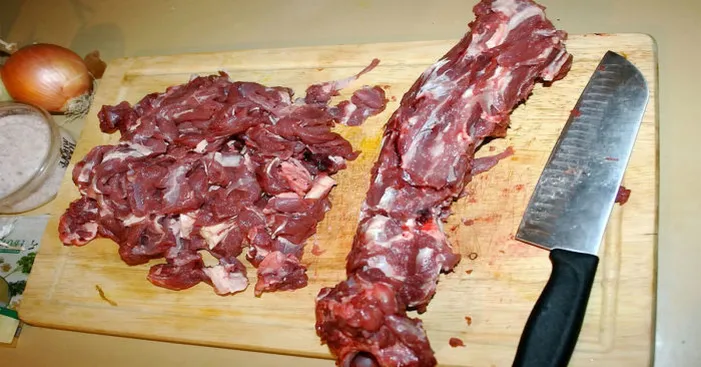
The first thing you need to know is that deer steak doesn’t cook like other game meat as it shouldn’t be overcooked and rather consumed rarely.
Deer steak is the best venison part in terms of taste and texture and the longlist of culinary options.
You can simply cut a deer steak into small pieces and sautée them with onions and spices.
Deer meat is also perfect for being cooked in a stew as it will add a gentle red meat flavor that blends well with the rest of the ingredients.
Among the ingredients that combine well with deer meat we mention:
- Fruits like: cranberry, cherries, blueberries…
- Vegetables like: mushrooms, garlic, onion, mashed potatoes, squash, carrots, celery, tomatoes…
- Herbs like: thyme, parsley, bay leaf…
- Seeds: lentils, rice, sorghum, green beans…
- Nuts like: walnuts, hazelnuts, cocoa, pistachios…
You can treat a deer steak the same way you cook beef or lamb, however, you just need to pay attention to the cooking time:
- Frying deer meat should take no more than 8 minutes.
- Roasting deer meat should take no more than 20 minutes for chopped pieces and 30 minutes for big steaks.
- Braising deer meat takes somewhere between 60 to 90 minutes.
Buying deer steak:
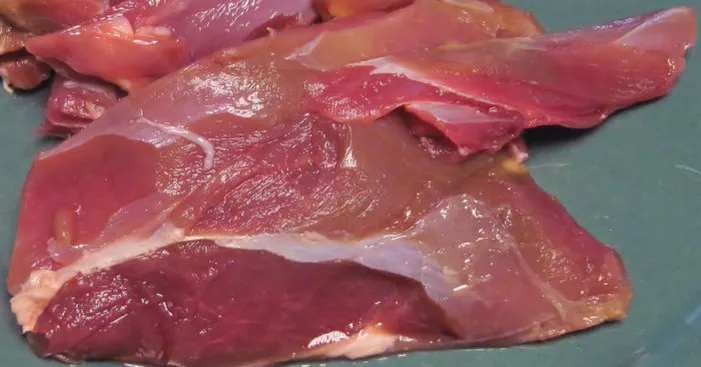
A general idea that applies to all game meat: the younger the better!
In case there is a labeled package on the deer steak, make sure you choose a deer that is between 3 and 5 years old.
Don’t worry even if there are no labels, there are other tips to ensure that you buy the best deer steak in the market:
- Deer meat should be well packed without any residues or ice.
- A deer steak should have a uniform dark red color and must feel soft and tender to the touch.
- Like all meat, deer steak shouldn’t smell unpleasant nor have grey spots as those are all signs of spoilage.
Storing deer steak:
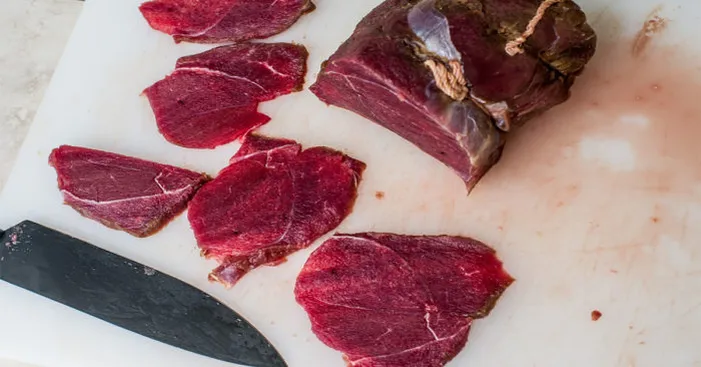
Since deer steak is very delicate it requires intense care when trying to store it for a long time.
Unlike chicken and beef, deer meat needs to be frozen at a temperature of less than 4°F (-20°C) immediately after purchase.
If frozen properly, a raw deer steak can be kept for up to 8 months in the freeze and about 3 months if the steak is cooked before freezing it.
However, to thaw an already frozen deer steak you need to place it in the fridge overnight before cooking it the next day.
Don’t forget that once you defrost any type of meat it is not healthy to freeze it again so make sure you only thaw what you’re going to use.
